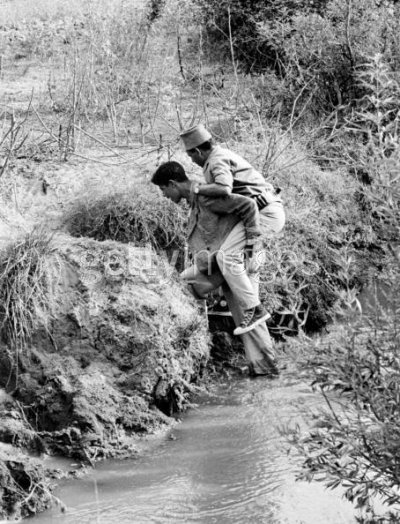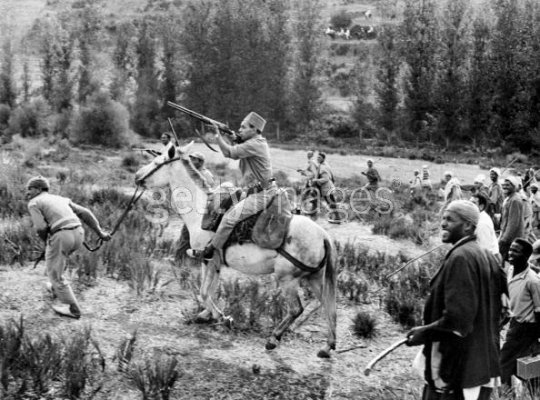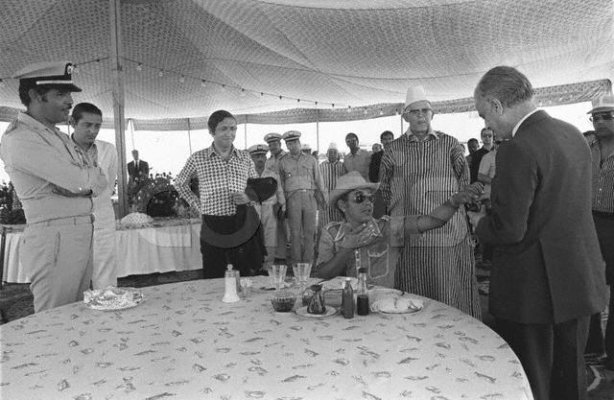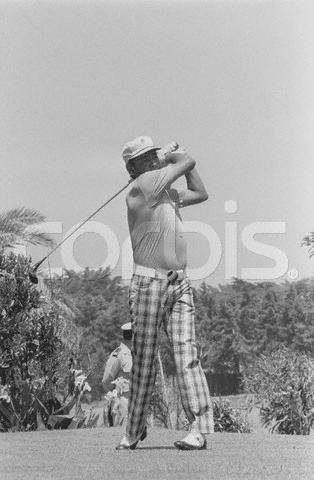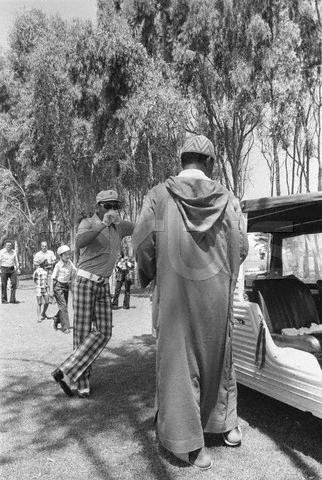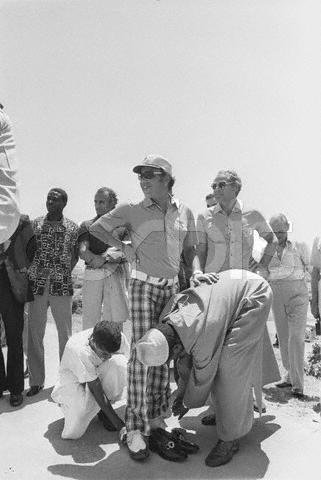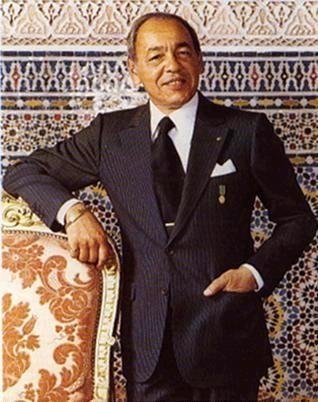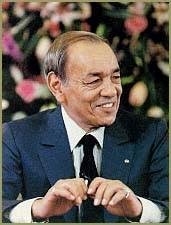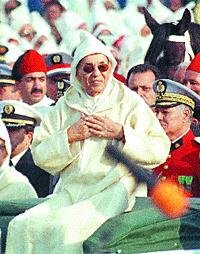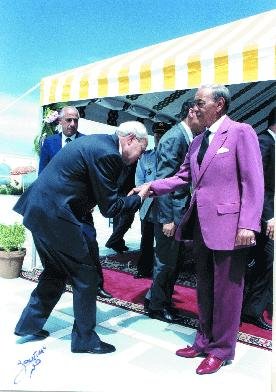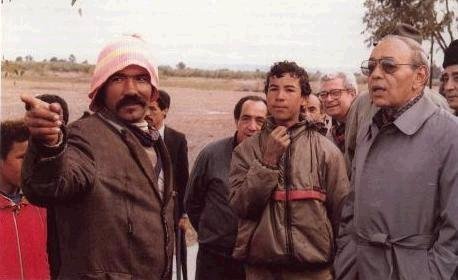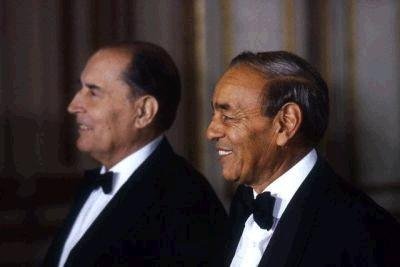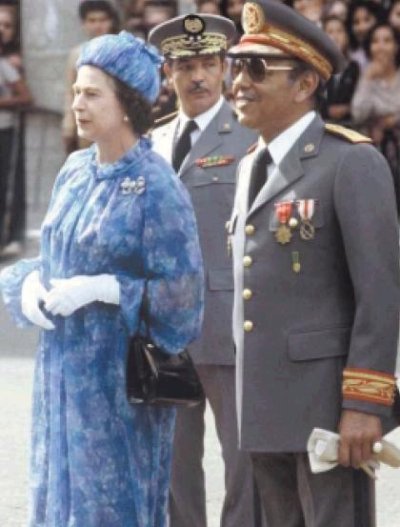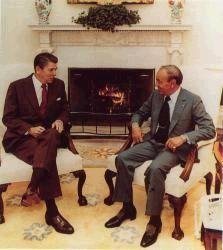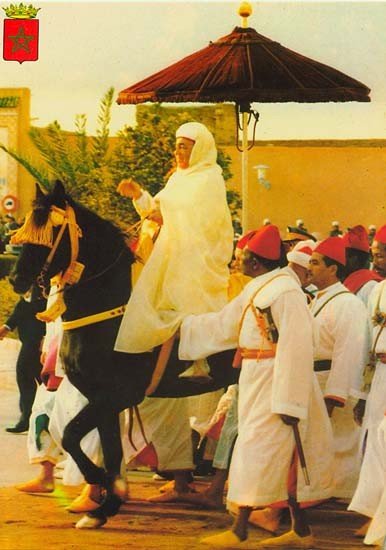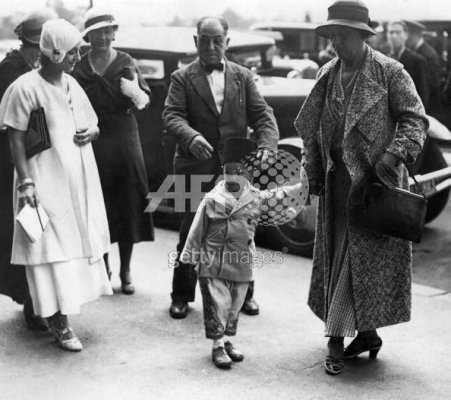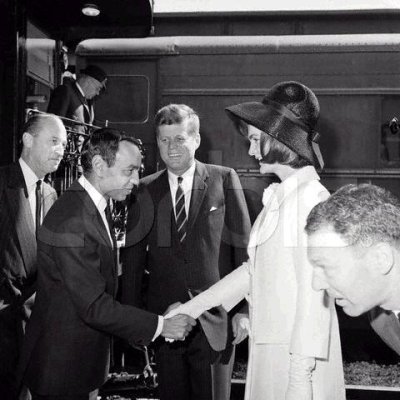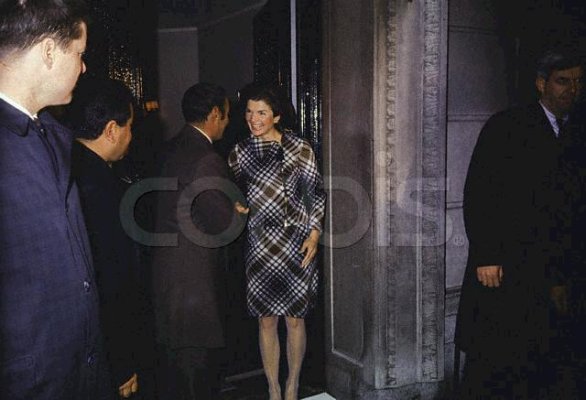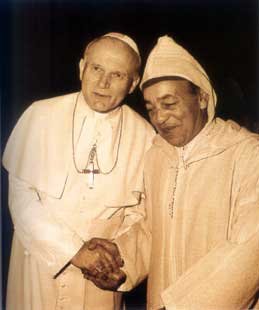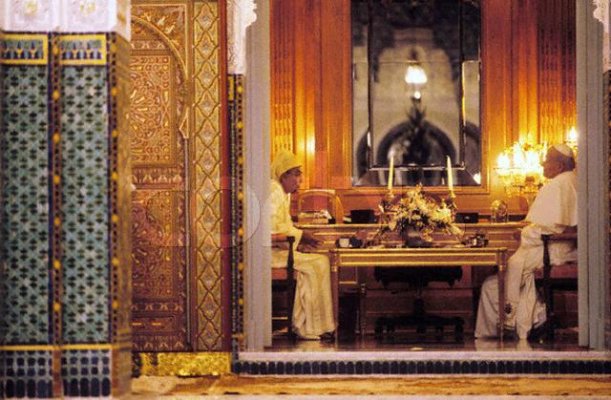LATE HIS MAJESTY KING HASSAN II
His majesty King Hassan II was born in Rabat on July 9th, 1929. He attended his first koranic science classes at the Royal Palace of Rabat.
After successful university studies in Rabat and Bordeaux (France), H.M. the King obtained in 1952 a D.E.S. (Master's degree) in public law.
His Majesty was brought up in an atmosphere marked by patriotism, heroism and mobilization. His father, the late King Mohammed V, gave his eldest son an education combining tradition and modernity and a training based on arab-islamic values and the principles of universal civilization.
Since his childhood, the sovereign witnessed great historical events.
In 1943, he attended, with his father, the Anfa conference where he met Churchill and Roosevelt. The Allies conference was held on the eve of the liberation of Europe and at an important turning point of the world history.
In 1944, His Majesty King Hassan II participated in drafting the Independence Manifesto together with representatives of the National Movement. Indeed, Prince Moulay Hassan was since his youngest age an active militant in the imperial college, the den of Moroccan militancy and nationalism.
In 1947, Prince Moulay Hassan took part in the historic trip of the late Mohammed V to Tangiers where his father delivered a speech claiming the independence of the country, its territorial integrity and its membership to the Arab League. He, himself, issued a call inviting the youth to mobilize for the liberation of the country.
on August 20, 1953, the protectorate authorities exiled to Corsica His Majesty Mohammed V, Prince Moulay Hassan and the royal family. They were transferred in January 1954 to Madagascar. Prince Moulay Hassan acted during the exile as his father's political advisor.
On November 16, 1955, His Majesty Mohammed V and the royal family returned from exile.
In February 1956, Prince Moulay Hassan took part, alongside his father, in the negotiations for independence.
After independence, His Majesty Mohammed V appointed his eldest son, Prince Moulay Hassan, in April 1956, chief of staff of the Royal Armed Forces.
On July 9, 1957, Moulay Hassan was officially proclaimed Crown Prince.
On March 3, 1961, following the decease of His Majesty Mohammed V, Moulay Hassan was proclaimed King of Morocco.
Since his enthronement, the sovereign endeavored to endow the country with democratic representative institutions at the national, regional and local levels.
His Majesty Hassan II has ceaselessly been working for the unification of the Kingdom and the consolidation of its independence and territorial integrity: liberation of the province of Tarfaya (1958) and the province of Sidi Ifni (1969).
In October 1975, His Majesty the King organized the glorious green march which liberated Sakiet-El-Hamra and Oued-Dahab (former Spanish Sahara) and returned them to the homeland.
His Majesty the King is one of the pillars of peace in the world. Thanks to his action, Morocco played a dynamic role within major international and regional organizations.
1960:
His majesty the King led the Moroccan delegation to the XV session of the United Nations General Assembly.
1961:
His Majesty the King took part, alongside his father, the later Mohammed V, in the first conference of Independent African States, a conference known as the +Casablanca Group+.
September 1961:
His Majesty the King delivered a historic speech during the Belgrade conference, marking the creation of the Non-Aligned Movement.
September 10, 1969:
His Majesty chaired in Rabat the first Summit of the Organization of Islamic Conference (O.I.C.), held following the burning of Al Aqsa mosque (Al-Quds)
December 21, 1969:
His Majesty the King chaired in Rabat the 5th arab Summit.
June 12, 1972:
His Majesty the King chaired in Rabat the 9th summit of the Organization of African Unity (O.A.U.)
October 26, 1974:
His Majesty the King chaired in Rabat the 7th arab summit which recognized, for the first time, the P.L.O. as the sole and legitimate representative of the Palestinian People.
May 8, 1979:
His Majesty the King was elected President of "Al Quds Committee", stemming from the Organization of Islamic Conference (O.I.C.), during the 10th conference of foreign ministers of islamic countries.
November 1981 and September 1982:
His Majesty the King chaired the 12th arab summit of Fes which adopted an action plan for peace and assigned a seven-member committee, chaired by His Majesty the King, to undertake the necessary contacts with permanent member countries of the security council with the aim of finding a peaceful, comprehensive and fair solution to the problem in the Middle East.
January 16, 1984:
His Majesty the King chaired in Casablanca the fourth summit conference of islamic countries (O.I.C.)
August 7, 1985:
His Majesty the King chaired in Casablanca an arab extraordinary summit.
December 14, 1988:
His Majesty the King chaired the XV French-African summit, in Casablanca.
February 16, 1989:
His Majesty the King chaired the constitutive Summit of the Arab Maghreb Union (U.M.A.) in Marrakesh.
May 23, 1989:
His Majesty the King chaired in Casablanca the arab extraordinary summit.
June 5, 1989:
His Majesty the King chaired in Rabat the first meeting of heads of state of the tripartite committee in charge of finding a solution to the Lebanese crisis.
January 22, 1990:
His Majesty the King took part in the ordinary session of the U.M.A. Presidency council in Tunis
September 15, 1991:
His Majesty the King chaired in Casablanca the 4th ordinary session of the U.M.A. presidency council.
January 31, 1992:
His Majesty the King delivered a speech at the summit of heads of state and government of the UN security council member countries.
October 21-30, 1992:
His Majesty the King paid an official visit to five arab countries (Saudi Arabia, United Arab Emirates, Jordan, Syria and Egypt).
September 21-24, 1993:
His Majesty the King paid an official visit to Portugal.
April 15, 1994:
His majesty the King chaired the closing session of the GATT ministerial conference held in Marrakesh and which led to the birth of the World Trade Organization (W.T.O.).
October 29, 1994:
His Majesty the King chaired the opening session of the first Economic Conference on North Africa and the Middle East, in Casablanca.
December 13, 1994:
His Majesty the King chaired in Casablanca the seventh islamic summit conference (O.I.C.)
January 15, 1995:
His Majesty the King chaired in Ifrane the 15th session of Al-Quds Committee
March 14, 1995:
His Majesty the King paid a state visit to the United States of America.
March 13, 1996:
His Majesty the King participated in the summit conference of "Peace Architects" in Sharm-Sheikh in Egypt.
May 6, 1996:
His Majesty the King paid a state visit to France
May 26, 1998:
His Majesty the King paid an official visit to Egypt
Imbued with an arab-islamic culture, modern jurist unmatched in the synthesis, His Majesty the King has shown great skills in architecture, science, medicine and technique. He wrote in 1976 "Le Defi" (The Challenge) that was translated into several languages.
In 1993, a book entitled "Hassan II, Memoire d'un Roi" (Hassan II, Memory of a King) was published in the Aarab and French languages. The book which is the result of a series of long interviews conducted by French journalist Eric Laurent with His Majesty the King is a document full of revelations, confidences and thoughts on power and monarchy in Morocco.
It is also a collection of memories on Moroccan and foreign figures whom the Sovereign met during his reign.
His Majesty King Hassan II is the father of five children:
-H.R.H. Princess Lalla Meriem, born on August 26, 1962;
-H.R.H. Crown Prince Sidi Mohammed, born on August 21, 1963;
-H.R.H. Princess Lalla Asmaa, born on September 29, 1965;
-H.R.H. Princess Lalla Hasna, born on November 19, 1967;
-H.R.H. Prince Moulay Rachid, born on June 20, 1970
As a father, the Sovereign has instilled into his five children a strong commitment to the search for learning and a dedication to uphold the values of their country and their people.
His Majesty King Hassan II is one of the major advocates of peace in the world. Thanks to his efforts, Morocco has been able to play an active role in major international and regional organizations.
Apart from his Arab-Islamic background, the monarch is a distinguished jurist who has an outstanding ability to rationalise and synthesize matters under consideration. His Majesty, King Hassan II, is well versed in the fields of architecture, medicine and technology. In 1976, he wrote "Le Defi" (The Challenge), a book which has been translated into several languages.
In 1993, a book entitled “Hassan II, la Mémoire d'un Roi” (“Hassan II, a King's Memory”) was published in Arabic and French.
During the same year, and as a follow up to the first publication, another book was published : “Les Images de la Mémoire d'un Roi” (“A King's Memory in Pictures”).
His majesty King Hassan II was born in Rabat on July 9th, 1929. He attended his first koranic science classes at the Royal Palace of Rabat.
After successful university studies in Rabat and Bordeaux (France), H.M. the King obtained in 1952 a D.E.S. (Master's degree) in public law.
His Majesty was brought up in an atmosphere marked by patriotism, heroism and mobilization. His father, the late King Mohammed V, gave his eldest son an education combining tradition and modernity and a training based on arab-islamic values and the principles of universal civilization.
Since his childhood, the sovereign witnessed great historical events.
In 1943, he attended, with his father, the Anfa conference where he met Churchill and Roosevelt. The Allies conference was held on the eve of the liberation of Europe and at an important turning point of the world history.
In 1944, His Majesty King Hassan II participated in drafting the Independence Manifesto together with representatives of the National Movement. Indeed, Prince Moulay Hassan was since his youngest age an active militant in the imperial college, the den of Moroccan militancy and nationalism.
In 1947, Prince Moulay Hassan took part in the historic trip of the late Mohammed V to Tangiers where his father delivered a speech claiming the independence of the country, its territorial integrity and its membership to the Arab League. He, himself, issued a call inviting the youth to mobilize for the liberation of the country.
on August 20, 1953, the protectorate authorities exiled to Corsica His Majesty Mohammed V, Prince Moulay Hassan and the royal family. They were transferred in January 1954 to Madagascar. Prince Moulay Hassan acted during the exile as his father's political advisor.
On November 16, 1955, His Majesty Mohammed V and the royal family returned from exile.
In February 1956, Prince Moulay Hassan took part, alongside his father, in the negotiations for independence.
After independence, His Majesty Mohammed V appointed his eldest son, Prince Moulay Hassan, in April 1956, chief of staff of the Royal Armed Forces.
On July 9, 1957, Moulay Hassan was officially proclaimed Crown Prince.
On March 3, 1961, following the decease of His Majesty Mohammed V, Moulay Hassan was proclaimed King of Morocco.
Since his enthronement, the sovereign endeavored to endow the country with democratic representative institutions at the national, regional and local levels.
His Majesty Hassan II has ceaselessly been working for the unification of the Kingdom and the consolidation of its independence and territorial integrity: liberation of the province of Tarfaya (1958) and the province of Sidi Ifni (1969).
In October 1975, His Majesty the King organized the glorious green march which liberated Sakiet-El-Hamra and Oued-Dahab (former Spanish Sahara) and returned them to the homeland.
His Majesty the King is one of the pillars of peace in the world. Thanks to his action, Morocco played a dynamic role within major international and regional organizations.
1960:
His majesty the King led the Moroccan delegation to the XV session of the United Nations General Assembly.
1961:
His Majesty the King took part, alongside his father, the later Mohammed V, in the first conference of Independent African States, a conference known as the +Casablanca Group+.
September 1961:
His Majesty the King delivered a historic speech during the Belgrade conference, marking the creation of the Non-Aligned Movement.
September 10, 1969:
His Majesty chaired in Rabat the first Summit of the Organization of Islamic Conference (O.I.C.), held following the burning of Al Aqsa mosque (Al-Quds)
December 21, 1969:
His Majesty the King chaired in Rabat the 5th arab Summit.
June 12, 1972:
His Majesty the King chaired in Rabat the 9th summit of the Organization of African Unity (O.A.U.)
October 26, 1974:
His Majesty the King chaired in Rabat the 7th arab summit which recognized, for the first time, the P.L.O. as the sole and legitimate representative of the Palestinian People.
May 8, 1979:
His Majesty the King was elected President of "Al Quds Committee", stemming from the Organization of Islamic Conference (O.I.C.), during the 10th conference of foreign ministers of islamic countries.
November 1981 and September 1982:
His Majesty the King chaired the 12th arab summit of Fes which adopted an action plan for peace and assigned a seven-member committee, chaired by His Majesty the King, to undertake the necessary contacts with permanent member countries of the security council with the aim of finding a peaceful, comprehensive and fair solution to the problem in the Middle East.
January 16, 1984:
His Majesty the King chaired in Casablanca the fourth summit conference of islamic countries (O.I.C.)
August 7, 1985:
His Majesty the King chaired in Casablanca an arab extraordinary summit.
December 14, 1988:
His Majesty the King chaired the XV French-African summit, in Casablanca.
February 16, 1989:
His Majesty the King chaired the constitutive Summit of the Arab Maghreb Union (U.M.A.) in Marrakesh.
May 23, 1989:
His Majesty the King chaired in Casablanca the arab extraordinary summit.
June 5, 1989:
His Majesty the King chaired in Rabat the first meeting of heads of state of the tripartite committee in charge of finding a solution to the Lebanese crisis.
January 22, 1990:
His Majesty the King took part in the ordinary session of the U.M.A. Presidency council in Tunis
September 15, 1991:
His Majesty the King chaired in Casablanca the 4th ordinary session of the U.M.A. presidency council.
January 31, 1992:
His Majesty the King delivered a speech at the summit of heads of state and government of the UN security council member countries.
October 21-30, 1992:
His Majesty the King paid an official visit to five arab countries (Saudi Arabia, United Arab Emirates, Jordan, Syria and Egypt).
September 21-24, 1993:
His Majesty the King paid an official visit to Portugal.
April 15, 1994:
His majesty the King chaired the closing session of the GATT ministerial conference held in Marrakesh and which led to the birth of the World Trade Organization (W.T.O.).
October 29, 1994:
His Majesty the King chaired the opening session of the first Economic Conference on North Africa and the Middle East, in Casablanca.
December 13, 1994:
His Majesty the King chaired in Casablanca the seventh islamic summit conference (O.I.C.)
January 15, 1995:
His Majesty the King chaired in Ifrane the 15th session of Al-Quds Committee
March 14, 1995:
His Majesty the King paid a state visit to the United States of America.
March 13, 1996:
His Majesty the King participated in the summit conference of "Peace Architects" in Sharm-Sheikh in Egypt.
May 6, 1996:
His Majesty the King paid a state visit to France
May 26, 1998:
His Majesty the King paid an official visit to Egypt
Imbued with an arab-islamic culture, modern jurist unmatched in the synthesis, His Majesty the King has shown great skills in architecture, science, medicine and technique. He wrote in 1976 "Le Defi" (The Challenge) that was translated into several languages.
In 1993, a book entitled "Hassan II, Memoire d'un Roi" (Hassan II, Memory of a King) was published in the Aarab and French languages. The book which is the result of a series of long interviews conducted by French journalist Eric Laurent with His Majesty the King is a document full of revelations, confidences and thoughts on power and monarchy in Morocco.
It is also a collection of memories on Moroccan and foreign figures whom the Sovereign met during his reign.
His Majesty King Hassan II is the father of five children:
-H.R.H. Princess Lalla Meriem, born on August 26, 1962;
-H.R.H. Crown Prince Sidi Mohammed, born on August 21, 1963;
-H.R.H. Princess Lalla Asmaa, born on September 29, 1965;
-H.R.H. Princess Lalla Hasna, born on November 19, 1967;
-H.R.H. Prince Moulay Rachid, born on June 20, 1970
As a father, the Sovereign has instilled into his five children a strong commitment to the search for learning and a dedication to uphold the values of their country and their people.
His Majesty King Hassan II is one of the major advocates of peace in the world. Thanks to his efforts, Morocco has been able to play an active role in major international and regional organizations.
Apart from his Arab-Islamic background, the monarch is a distinguished jurist who has an outstanding ability to rationalise and synthesize matters under consideration. His Majesty, King Hassan II, is well versed in the fields of architecture, medicine and technology. In 1976, he wrote "Le Defi" (The Challenge), a book which has been translated into several languages.
In 1993, a book entitled “Hassan II, la Mémoire d'un Roi” (“Hassan II, a King's Memory”) was published in Arabic and French.
During the same year, and as a follow up to the first publication, another book was published : “Les Images de la Mémoire d'un Roi” (“A King's Memory in Pictures”).


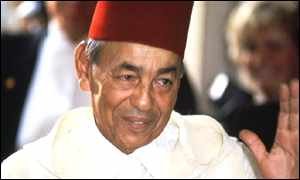
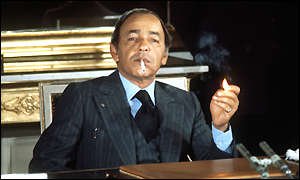
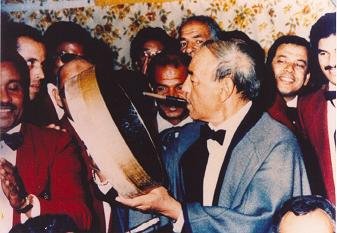
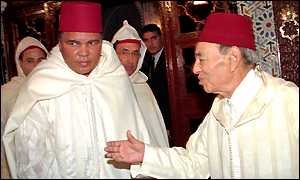
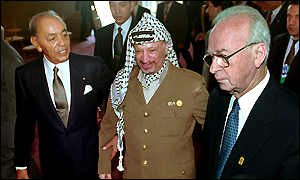
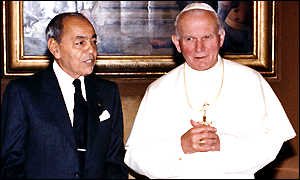
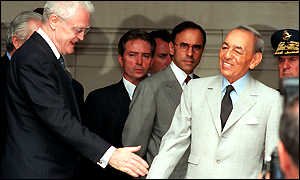
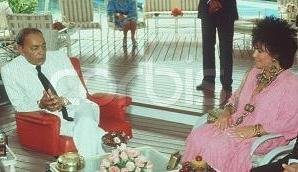
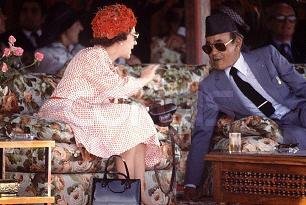
 :flower:
:flower: 